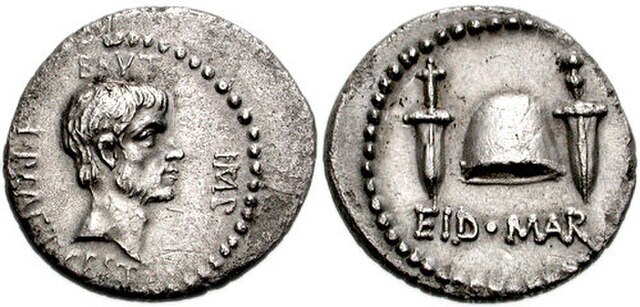The Second Triumvirate was an extraordinary commission and magistracy created for Mark Antony, Lepidus, and Octavian to give them practically absolute power. It was formally constituted by law on 27 November 43 BC with a term of five years; it was renewed in 37 BC for another five years before expiring in 32 BC. Constituted by the lex Titia, the triumvirs were given broad powers to make or repeal legislation, issue judicial punishments without due process or right of appeal, and appoint all other magistrates. The triumvirs also split the Roman world into three sets of provinces.
A 19th century depiction by Jean-Léon Gérôme of Caesar's corpse and the assassins' celebration.
Coin, minted by Marcus Junius Brutus in 42 BC, depicting himself on left and commemorating the assassination of Julius Caesar on the Ides of March on right.
Coin depicting Lucius Antonius.
Sextus Pompey, depicted on an aureus minted c. 36 BC.
Marcus Antonius, commonly known in English as Mark Antony, was a Roman politician and general who played a critical role in the transformation of the Roman Republic from a constitutional republic into the autocratic Roman Empire.
Flavian-era bust of Antony
Antony's brother Lucius, on a coin issued at Ephesus during his consulship in 41 BC
Hellenistic bust of Pharaoh Ptolemy XII Auletes.
Cato the Younger was one of Caesar's chief opponents before the outbreak of the civil war.







